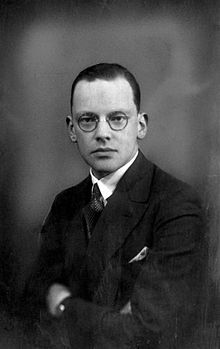Menno ter Braak
| Menno ter Braak | |
|---|---|
 |
|
| Born |
January 26, 1902 Eibergen, Gelderland |
| Died | May 14, 1940 (aged 38) The Hague |
| Nationality | Dutch |
| Education | University of Amsterdam |
| Occupation | Author |
Menno ter Braak (26 January 1902 – 14 May 1940) was a Dutch modernist author.
Ter Braak was born in Eibergen and grew up in the town of Tiel where he was an exemplary student. He went on to the University of Amsterdam where he majored in Dutch and History. He was a regular contributor to the student magazine Propria Cures and involved himself in the study of film (then a very young discipline).
Together with Joris Ivens, Menno ter Braak was also a founder of the Filmliga (Movie League), an organisation for the study of animated film. He completed a Ph.D. dissertation on the medieval emperor Otto III and consecutively worked as a teacher in a number of secondary schools.
In 1932 ter Braak, together with Edgar du Perron and Maurice Roelants, started the literary magazine Forum which proved to be one of the most important literary periodicals in the Dutch-speaking world (it expressly involved Flemish intellectuals as well) in the nineteen-thirties. Forum is widely considered a bulwark of cultural elitism, advocating a high cultural level of discourse, a rational form of literary criticism, consequent individualism and a stern disapproval of all intellectual ornamentation. “Vent boven vorm” (loosely translated: ‘personality over form’) was the catchword of the Forum movement, and Multatuli was one of its most important paragons.
In 1933 ter Braak, then living in The Hague, joined the Dutch liberal daily Het Vaderland (the Fatherland) as a literary affairs editor and was one of the first Dutchmen to understand the looming threat of Nazism. It is in these years that he started het Comité van Waakzaamheid (the Committee for Vigilance). As a public intellectual, he is most famous for his essays, most of which deal with European culture, politics, or a mixture of the two. He is distinctly influenced by Nietzsche and his style is deliberately paradoxical.
...
Wikipedia
